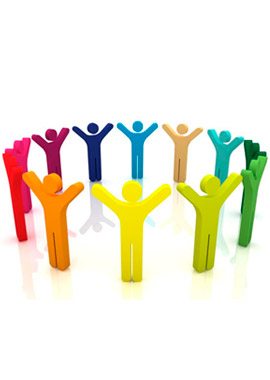Amidst controversies over the Enem of 2015 and the program of children and pre-teen chefs being harassed on the internet, it is possible to observe a phenomenon: at the same time that progressive and politicized movements are working together to combat gender-based violence, prejudice and discrimination (by ethnicity, color of skin, sexual orientation, gender identity, etc.), there is a group of people who recognize each other as defending prejudiced, violent and discriminatory.
These groupings, amplified by social networks, end up functioning as bubbles within which it is possible to speak one's mind or even engage in acts of aggression and exclusion without their members being afraid of being socially excluded. On the contrary, they feel supported by the group. There is an identification between the members of the group (horizontal identification) which occurs through gravitation towards a set of ideas and worldview, and it is quite common for there to be a spokesperson or leader with whom the other members identify (identification vertical). In this way, a complex and cohesive group is created, capable of acts that they would not do alone. Freud He well described this in Mass Psychology and Analysis of the Self (1921).
the formation of groups and horizontal and vertical identifications are not necessarily bad. Identifying with others is something that is part of human constitution. Whether something good or bad will result from this will depend on the form of this identification, the content of these ideals and the acts engendered from there.
Having made this preamble, I would like to address the feeling of belonging in this month's column. Be part of a social group, finding support, support, comfort and security in it, as well as support for the image one has of oneself and the way one sees the world are important elements in the life of a human being, especially in childhood and adolescence, times when that the person is becoming.
It turns out that in current Western society this feeling of belonging has become increasingly fragile. An example: people whose social circle is restricted to co-workers, when they lose their job they can fall into deep loneliness and isolation, a very distressing situation that shows how much aspects of social and public life are reduced to just one place or activity. , in this example work. The multiplicity of events, the speed of social life, innovations, the lack of time and social spaces seem to contribute greatly to making this feeling of belonging increasingly fragile.
And what can we observe from the groups mentioned at the beginning of the text? Now, these are people who often don't even know each other, with different professions, visiting different places, but who feel welcomed and supported by others, being part of a social group.
It would not be an exaggeration to say that we are heading towards the creation of a society in which being part of a militancy (whether in favor of equality, freedoms, otherness and solidarity, or in favor of violence, discrimination and prejudice) will increasingly be a defining element of identities. The motto would be: “I am the cause I defend!”
Then the reader may think: “Ah, so if everyone just leans towards good, supportive, libertarian causes, the world will be a better place, right?” Then we ran into some problems. One of them is the narcissism of small differences. For a group to constitute itself as a group, one more element is needed: the external, the outside, what is on the other side. This external element is what is perceived as being different, opposite or contrary to the aspects around which the group was constituted. What if this element is not present? Well, then internal splits begin to appear: the slightest differences within the group begin to cause discomfort, fights and in some cases the split into two or more groups, which are very similar, but with minimal differences between them that define and oppose them.
Another point is that aggressiveness is part of the human being and it is not possible to eradicate it. Even because this is not desirable. Aggressiveness, if used well, is very good.
“So, what to do?” the reader might ask. This is not an easy answer. I will outline two possible strategies that can serve to answer at least in part this question: create free social spaces, where coexistence between people is valued and does not depend on work or religion, where it is possible to be with others in a civilized way. And a civilized society is one in which a law prevails that mediates between people, everyone being subject to it. A civility This is what allows the law of the jungle not to prevail, with the strongest swallowing and killing the weakest.
Another point: societies markedly individualists end up creating a vacuum easily filled by some group or institution that provides this feeling of belonging. It is no surprise that a country that calls for individualism as much as the USA has so many extremist religious groups capable of barbaric acts, such as going to funerals, cursing those in mourning or preventing others from having access to basic rights. Nor is it a coincidence that the creation of the most varied groupings around specific causes is proliferating there every day. It is from a minimum of social security and welcoming democratic institutions that it is possible for fewer people to be tempted to blindly adhere to a cause. (be it good or bad).
I chose this topic because I see that it is common for young people to come to the office as a demand LGBTTs who feel an immense fear of being ostracized if they come out. Continuously living with this fear can make it almost irresistible to join groups that promise acceptance, and some of these groups may not be well-intentioned at all.
Leandro Salebian is a psychologist (CRP 06/99001) graduated from the USP Psychology Institute. He has worked in the area of mental health in an Adult CAPS and is now dedicated exclusively to working in a private practice. He continues his training by studying Psychoanalytic authors and has a critical and attentive look at issues of gender and sexual diversity. Also access your website



